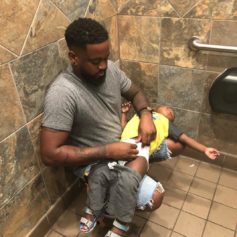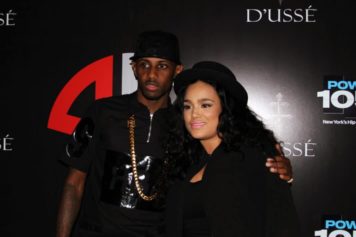Editor’s Note: At Atlanta Black Star, we are spending this entire week celebrating, honoring, exploring and uplifting Black Fatherhood by examining it through the lens of 7 themes: Lead, Build, Provide, Care, Protect, Work and Love. In this first piece in the series, Diane Weathers, former Editor-in-Chief of Essence magazine, delves into the huge impact her stepfather Thomas Jones Sr. (TJ) had on not only her life but in the community he served for many years with his barbershop. Like so many other black fathers across the country who quietly serve as leaders and role models in their own community, TJ was a strong figure who didn’t look for praise or awards. Day in and day out, he simply got the job done.
Prize-winning author Isabel Wilkerson in The Warmth of Other Suns waxes long and lovingly about the impact her late father had on her life. He was the kind of man who must have set a high bar when it came to measuring the character of the men she would allow in her life. But I grew up with a different experience.
My father left my mother and me when I was two and we didn’t connect again until I was nineteen. After a year or two we would lose touch again, this time for good. My mother’s relationship with her father was similarly fractured. Growing up, most of my girlfriends also lived apart from their fathers. For a girl, fathers are not just about fathering. They are that all important introduction to the world of men, especially for a girl like me from a small clan with few males and no brothers. But my early experiences taught me that fathers and men in general were elusive figures, hard to figure out—at worst, a flat-out disappointment.
And then along came T.J.
I must have been in my mid-30s when my mother and Thomas Jones, Sr. started seriously dating. They had known each other since they were teenagers in Orange, New Jersey, and I had vague memories of meeting him when I was a child and wishing that he was my daddy. When my mother asked me to join his son Tommy as a witness at their wedding, I was thrilled at this dream come true.
TJ was a good-looking man. He was what they used to call back in the day, a “sharp dresser.” But it was his character and personality that made him stand out. He loved people, a trait that went hand in hand with the business he was in. TJ was a barber and by the time he entered my life, he co-owned his own shop, a community hub which men continued to patronize long after they left the neighborhood and moved elsewhere. He loved to tell jokes not simply to hear himself talk but simply for the pleasure of making you laugh, something he managed to do even though his punch line was always the same. “Don’t fight the feeling,” was his oft-repeated kicker.
He was the consummate story teller who regaled his patrons and loved ones alike with tales like the story of running away from his home in New Jersey to his birthplace in Jim Crow Alabama, an effort to escape the belt of his mean father. As a journalist, I would write frequently about black male/female relationships and attribute black men’s difficulty in being present for their families to the abuse they experienced in growing up. But TJ’s story of his reverse migration was one he shared without the slightest hint of bitterness.
The hardships he endured clearly didn’t diminish the love he had for his family. He constantly boasted of his children’s success and proudly claimed bragging rights once I entered the family. During the years he was married to my mother he ended each week the same, bringing home a bouquet of fresh flowers. But at the time I knew him no one claimed more of his attention than his grandson Doug, the son of his daughter Dedra (aka “the Princess”) who would follow in his footsteps and help support himself during his college years at Hampton by, what else: cutting hair.
TJ’s rep and name may not have extended much further than his barber shop, his family and his large circle of patrons and friends. But in my mind he will always be a hero and a giant among men, an ordinary guy made larger than life by his extraordinary sense of compassion for others and the sheer pleasure he derived from being a loving father.
Diane Weathers, a former editor in chief of Essence Magazine, is a veteran journalist and freelance writer. She is currently completing her first novel.
Click below to watch excerpts from our interviews with black men on the power of black fathers as Leaders.


